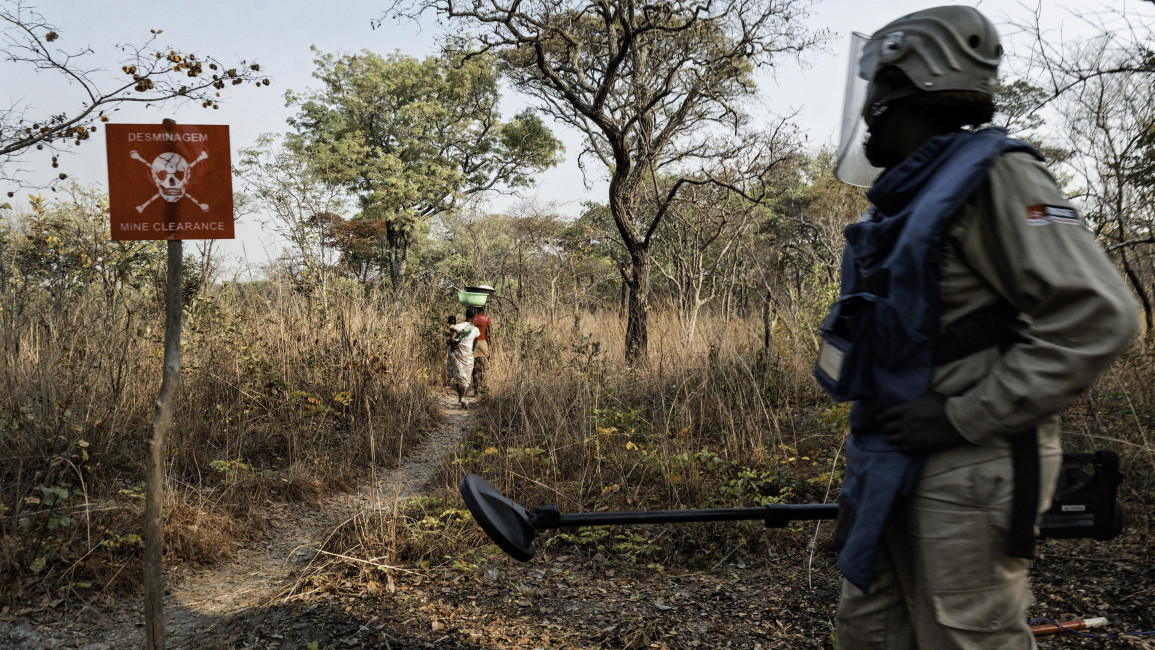
The UK must immediately rethink its decision to cut support for demining in MENA
The UK has a new Foreign Secretary, Liz Truss. And, this month, she has been faced with the fallout of a surprise move made by her predecessor. Before taking up the post, the Foreign, Commonwealth and Development Office signed off on plans to slash UK funding for humanitarian mine action by around 75 per cent.
The cuts would be a catastrophic collapse in support that would harm the lives of vulnerable people across the world, particularly in the Middle East and North Africa.
"People in Iraq, Lebanon, South Sudan, Zimbabwe, Myanmar and Vietnam would no longer receive any UK support for their efforts to rid communities of the peril of landmines and other remnants of war, and other countries would see their funding greatly reduced"
More than 60 million people live in fear of landmines and unexploded bombs — and every day, 15 people are killed or injured by these indiscriminate weapons. Almost half of the civilians killed are children.
Clearing landmines and unexploded bombs saves lives. It also means children can go back to school safely, communities can grow crops on their land, and families can return to their homes.
In few countries is mine clearance more impactful than in Lebanon, Iraq and South Sudan, where communities have been littered with deadly explosives from new crises and the legacies of old wars.
MAG works to find and safely dispose of these indiscriminate explosives to support women, girls, boys and men to live, work and play free from a deadly legacy of war.
Work that would not have been possible, however, without the support of the UK government.
Therefore, the proposals to slash its previous three-year mine action funding of nearly £125m to just £25m for the next three years is devastating. People in Iraq, Lebanon, South Sudan, Zimbabwe, Myanmar and Vietnam would no longer receive any UK support for their efforts to rid communities of the peril of landmines and other remnants of war, and other countries would see their funding greatly reduced.
|
MAG's work clearing the deadly legacy of conflict is helping boys and girls safely access an education. Boys and girls walk to school in Iraq 2021 (MAG) |
Withdrawing all support for South Sudan would be particularly shocking. Conflict and famine are at the epicentre of a growing humanitarian emergency in the country. Landmine clearance here can and is making a vital contribution to food security and political stability.
Meanwhile, the decision to remove funding from Lebanon, a country on its knees, is already having a heartbreaking impact. Not only have dedicated deminers lost a vital source of income amidst an economic crisis, but that same crisis is driving people out of the cities into rural areas to find land to grow crops to feed themselves and their families.
The land these desperate families are finding is littered with the explosive legacy of conflict. Because of the cuts, which have already come into effect in Lebanon, organisations like MAG no longer have the resources to make all of this land safe in time to prevent tragedy.
MAG works extensively in Iraq, but does not currently receive UK funding for this work, despite Iraq one of the most heavily mined countries in the world. But day in and day out, our colleagues there see, first-hand, the devastating impact of the deadly mines left behind by the recent ISIS occupation and previously during the Iran-Iraq war, first Gulf War and the 2003 invasion.
We also see the empowering effects of demining work. For Yazidi women like Amsha and Hana, working with MAG to clear their communities in Sinjar is about much more than just providing safe homes for the Yazidi people to return to.
ISIS reserved some of its most brutal persecution for the Yazidi community — mine action is a way to help heal communities and peoples ravaged by grief and suffering, by placing women at the forefront of this recovery.
Mine action also aligns with British strategic interests and demonstrates British values.
The UK government has previously been a global leader in mine clearance and was one of the founding signatories of the Mine Ban Treaty. It is no coincidence that the two largest mine action organisations — MAG and The HALO Trust — are British.
Former UK development secretary, Andrew Mitchell MP, notes that the impact of the proposed cuts is "a matter of grave concern" for Britain's standing in the world.
He adds: "the lessons of history teach us that unstable nations turn into unstable regions and that we ignore countries plagued by conflict and instability at considerable cost, in both lives and treasure."
In other words, the cuts will cost lives and work against UK national strategic interests in the long term.
Liz Truss has the opportunity to restore mine action funding. To restore the UK as a global leader, ensuring that vulnerable communities in the Middle East and North Africa and around the world can live a life free of the scourge of landmines.
In restoring this funding, the new Foreign Secretary could ensure the UK is stepping up — not back — from its support to the millions of people affected by poverty, inequality and war.
Darren Cormack is CEO of the Manchester-based Nobel Peace Prize-winning international landmine clearance charity the Mines Advisory Group (MAG)
Have questions or comments? Email us at: editorial-english@alaraby.co.uk
Opinions expressed here are the author's own, and do not necessarily reflect those of her employer, or of The New Arab and its editorial board or staff.




